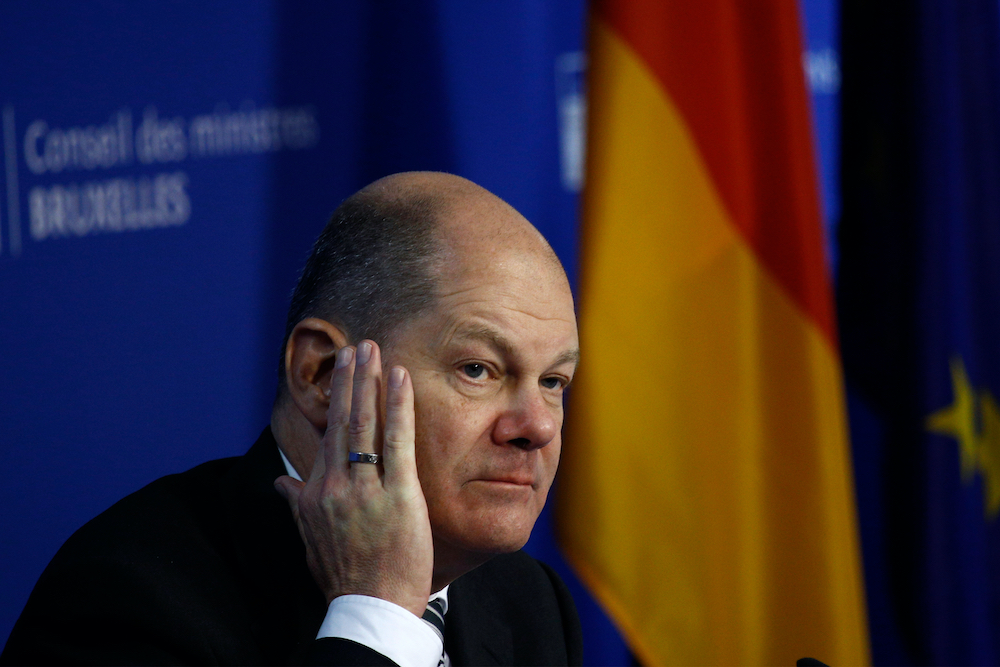The financial transactions tax (FTT), as proposed by German Finance Minister Olaf Scholz, does not deal with the problem of excessive market speculation but instead penalises long-term investors like pension funds and insurers, writes Jan Wagner…
After the 2008 financial crisis, EU governments considered introducing a financial transaction tax as part of several measures that would prevent such events from recurring. The idea behind the FTT is that it should deter excessive speculation and, in doing so, promote market stability. Whether the FTT actually has that effect is still unknown. After years of discussion, EU governments never agreed to introduce the tax across the 28-member bloc.
However, a coalition of EU governments has continued discussing a tax that they are calling an FTT but which has little to do with the original idea – namely curbing activities like excessive short selling or high frequency trading. Just last December, German Finance Minister Olaf Scholz (pictured )said he had forwarded his proposal for an FTT to the “coalition of the willing”. Along with Germany, that group includes France, Spain, Italy, Belgium, Greece, Portugal, Austria, Slovakia and Slovenia. Under EU rules, at least nine of the group must agree to the proposed tax for it to take effect. The earliest date for that is 2021.
Scholz’s proposal calls for a levy on the purchase of shares in companies with a market value above EUR1 billion. However, the tax, which equals 0.2 per cent of the purchase value, would affect exactly those who are not speculators, but long-term investors like pension funds and insurers. These institutions account for 97 per cent of the stock investors in Germany, with the remaining three per cent being private clients. While the proposal allows for an exemption for pension funds, asset manager sources say this isn’t likely as the tax would not generate the desired revenue. In Germany alone, the revenue from the tax is estimated at EUR1.2 billion per annum.
So why is Germany’s finance minister departing from the principle of the FTT and penalising non-speculative investors? The answer may seem banal, but it’s easier for him to tax domestic investors than to go after hedge funds or high frequency traders that operate internationally. On the finance ministry’s website, Scholz himself says he needs the revenue for a political initiative (called the “Grundrente”) under which more Germans would retire with the maximum state benefit. Scholz also justifies the tax by stating: “When you buy a sausage or a book, you pay a tax on the transaction. With shares, no such tax is applied. That rightly annoys a lot of people, so we want to change that.” Scholz’s latter remark is not completely accurate as since 2009, Germany has imposed a tax on capital gains from securities like shares.
Scholz’s “pseudo FTT” has, in any case, got German institutional investors up in arms. Stinging criticism comes from Berlin-based ABV, which is an association for pension funds serving physicians, lawyers and architects.
“Contrary to the original intention of stabilising financial markets, the FTT as proposed is a fiscal measure. And instead of targeting high-frequency traders, the tax would just burden pension funds and private investors,” says Stefan Strunk, an ABV’s managing director for political relations.
ABV’s members have EUR230 billion in assets under management. Strunk also notes that Scholz’s FTT contradicts the German government’s stated intention of supporting private and corporate pensions. Indeed, those pensions are needed to supplement a state pension benefit that is declining due to demographic trends. Says Strunk: “Share investments have never been more important in helping people save more for retirement. As a result, the FTT as proposed would not affect those responsible for the financial crisis but every day citizens. That is socially unacceptable.”
Jörg von Fürstenwerth, chief executive of German insurance association GDV, echoed Strunk’s complaint that Scholz was endangering private and corporate pensions with his tax. “Due to this fact, our association has reminded the government of its earlier promise that the FTT would not burden those pensions,” says von Fürstenwerth. The GDV’s members represent no less than EUR900 billion in assets. Thomas Richter, chief executive of German asset management association BVI, even suggested that a dubious deal has been struck for the sake of getting Scholz’s FTT implemented.
“It looks as though tax revenue from German stockowners will be used to buy the support of smaller EU states (eg Slovakia and Slovenia), as they would not raise enough revenue from the tax to cover the administration costs,” says Richter.
That said, there is fair chance that Scholz’s FTT will not materialise. This is because the coalition has already lost the key support of Austria. As the year began, Austria’s new Conservative-Green government rejected the proposal on the grounds that it did not uphold the goal of reining in excessive speculation. Should another member of the coalition get cold feet, Scholz’s proposal will be scrapped. That would not only come as a great relief to German institutions that provide pensions, but also to their investment managers whose business would be negatively impacted by the tax.







